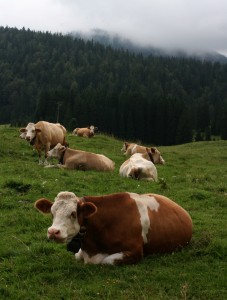 Switzerland has 600,000 cows, produces 3.4 million tons of milk with a huge number of small scale farms in both mountainous and valley regions. Around 100,000 of the cows go up in the mountains in summertime, where 2,700 seasonal farms ensure the summer milking.
Switzerland has 600,000 cows, produces 3.4 million tons of milk with a huge number of small scale farms in both mountainous and valley regions. Around 100,000 of the cows go up in the mountains in summertime, where 2,700 seasonal farms ensure the summer milking.
Tradition meets Swiss market
Switzerland left the quota system in 2009. After a rather tough landing, EDF will discover how dairy farmers have challenged the new environment and developed successful strategies. Producing more milk isn’t the only way, EDF will also discover that farmers try to adapt to specific demands and valorise their dairy production with higher milk prices.
Swiss cheese is world known, and 1/3 of the Swiss milk is produced without silage from non-pasteurized milk in order to respond to different products like Emmentaler and Gruyère, or Appenzeller. About 600 “artisanal” cheese factories buy 40 % of Swiss milk, and produce 100,000 t of traditional cheeses made of raw milk. The other 60 % of the milk are bought mainly by 4 big processors.
A lot of questions come to our mind when we try to understand the “Swiss dairy model”, as EDF: How do Swiss farmers handle their geographic constraints? How do they manage to feed their cows efficiently without silage? Is it possible to be financially successful with 25 cows? Small cheese makers: is it a strength or a weakness? How did they handle the end of quota in 2009? What are their challenges and new possibilities in the future?
EDF Congress in Winterthur
In EDF, we know that it’s a lot to learn in regions and farms where the production is very different from ours. It’s never a matter of “copy and paste”, but a matter of understanding what makes a successful strategy. To improve our strategy, EDF finds inspiration in other farmer’s ability to cope with their challenges and specific constraints. Our congress isn’t only about Swiss dairy production. As every year, you can also…
…find a network of curious, open-minded, forward-oriented, successful farmers.
…share experience and knowledge between farmers, our scientific team and our business partners.
…listen to speakers who open our perspectives to new horizons.
…participate in workshops where we compare our farm figures and benefit from the experience of our European colleagues.
…spend precious time discussing with inspiring people at farms, at meals and during the breaks.
This is the unique recipe that has been EDF’s success for the last 20 years, and it’ll bring us into the future. Business economy is always a question about ability to cope with changes, new demands, new regulations, innovations, risks and opportunities. Through EDF, you can step back, get a wider view of what are the crucial questions for the European dairy sector, and for you as a farmer.
EDF thinks Swiss farmers won’t deny that the big changes they’ve been through
since 2009 were hard to deal with, but as the saying goes: “Changing is difficult,
not changing is fatal”. Maybe a message to take with us one year before
the end of milk quotas in EU?
For more information and the Congress program, see www.dairyfarmer.net (website EDF).
The text above on this website is part of the Welcome letter of EDF president Katrine Lecornu.

